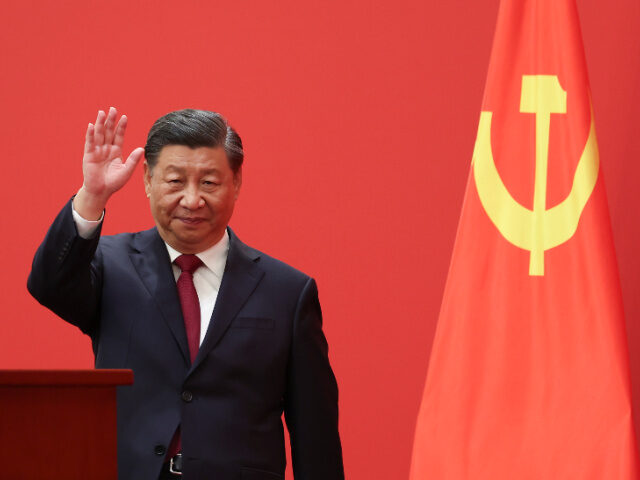Chinese dictator Xi Jinping was among the first world leaders to congratulate “moderate” politician Masoud Pezeshkian on winning the sham presidential election in Iran this weekend, ensuring Beijing a priority position in the foreign policy of an Islamist state while continuing his genocide of Muslims at home.
Xi has endeavored to improve relations with most of the Middle East by using the Belt and Road Initiative (BRI) – a global debt trap program offering predatory loans to finance overpriced infrastructure projects – and supporting the anti-Israel cause following the barbaric October 7 attack by the Iran-backed terrorist organization Hamas. Iran is one of China’s closest allies in the West, a top source of oil imports for China and now a member of the Beijing-led BRICS anti-American bloc.
China increased its investment into Iran tenfold between 2023 and 2024, the head of Iran’s Organization of Investment, Economic and Technical Assistance (OIETAI) revealed in February.
“In the face of the complex regional and international landscapes, China and Iran have always supported each other and stuck together through thick and thin,” Xi reportedly told Pezeshkian in a message to the president-elect on Saturday following the publication of election results. According to China’s state-run Xinhua News Agency, Xi called for “continuously consolidating strategic mutual trust, steadily promoting exchanges and cooperation in various fields, and maintaining sound communication and coordination on regional and international affairs.”
“The Chinese president said he attaches great importance to the development of China-Iran relations, and is willing [to] work with Pezeshkian to guide the deepening of the comprehensive strategic partnership between the two countries,” Xinhua added.
Iran held a runoff presidential “election” on Friday between Pezeshkian, who ran as a “moderate” sympathetic to the anti-regime protest movement, and Saeed Jalili, a protege of “supreme leader” Ayatollah Khamenei who represented the “hardline” wing of Iranian politics. Iran’s presidential elections are of minimal significance as Khamenei controls all aspects of the Iranian government, typically using the “president” as a global representative who parrots the will of the ayatollah. The elections are neither free nor fair, as a “Guardian Council” of elder clerics has total control over who appears on the ballot, banning 95 percent of would-be candidates.
Pezeshkian won the first round of voting on June 28 with about 42 percent of the vote, under the 50-percent threshold necessary to win outright and triggering the rare runoff election.
The Chinese state media outlet Global Times, which often serves as a mouthpiece for Communist Party opinions, claimed in an article on Sunday that Pezeshkian’s reputation as a “reformist candidate” would be unlikely to damage Tehran’s relationship with Beijing.
“The new president is likely to focus or even prioritize reviving ties with West, especially the US, after taking office, in the hope that those countries will lift certain sanctions, which will boost Iran’s economy,” one Global Times expert, Professor Liu Zhongmin, was quoted as saying.
“Liu believes Pezeshkian will continue stabilizing and consolidating ties with both China and Russia, as those diplomatic direction are a consensus reached by Iranian top-tier politicians,” the Global Times added.
Another regime-approved “expert” told the Global Times that “Iranian conservatives,” by which they mean jihadists, “still dominate the country’s politics” and will prevent any attempts by Pezeshkian to improve ties with America.
The first round of voting in the Iranian presidential election reportedly attracted a 39-percent turnout, the lowest documented on record, and dissidents reported that many voting centers were empty throughout the day, indicating that the regime may have inflated even that paltry number.
The turnout prompted Khamenei himself to deliver remarks prior to the runoff vote urging the public to participate – and denying that low turnout was a sign of little faith in the Islamist “revolution.” Khamenei said in remarks on Wednesday that the turnout in the first round was “lower than expected” and that voting in an election with no meaningful choice whose results are orchestrated by a dictatorship is the “backbone and source of pride for the Islamic Establishment.”
“Supposing that the people who did not vote in the first round (of the presidential election) are opposed to the establishment is a totally wrong interpretation,” Khamenei insisted.
His denial did not acknowledge a nationwide campaign to boycott the election on the grounds that it is a sham.
Pezeshkian’s surprisingly positive results in the first round of voting led to significant debate in the anti-regime movement regarding whether or not to boycott the runoff election. Some argued that the boycott is pivotal to deny legitimacy to the decades-old Islamist regime. Others suggested that ensuring the radical Jalili stayed out of office was more important than making a statement by not voting.
Iranian officials confirmed on Saturday that Pezeshkian defeated Jalili by nearly three million votes. The president-elect increased his support to nearly 50 percent of participants. Pezeshkian responded to the results by immediately issuing statements swearing loyalty to Khamenei and the “revolution.” The powerful Iranian armed forces similarly made public displays of support to Pezeshkian discouraging anti-regime Iranians that the new president would challenge the state terrorist regime.
Pezeshkian will succeed Ebrahim Raisi, a “hardliner” president with a history of killing political dissidents whose administration was marked by a significant increase in police violence against political dissidents and a rise in Chinese investment in the country.
Raisi died in a mysterious helicopter crash in May, alongside his foreign minister, Hossein Amir-Abdollahian, and several other Iranian officials. Pezeshkian will take over as president in August.
WATCH — Sec. Blinken Defends Condolences for Iranian President Raisi: “Normal Course of Business”
Video Source: C-SPAN
COMMENTS
Please let us know if you're having issues with commenting.